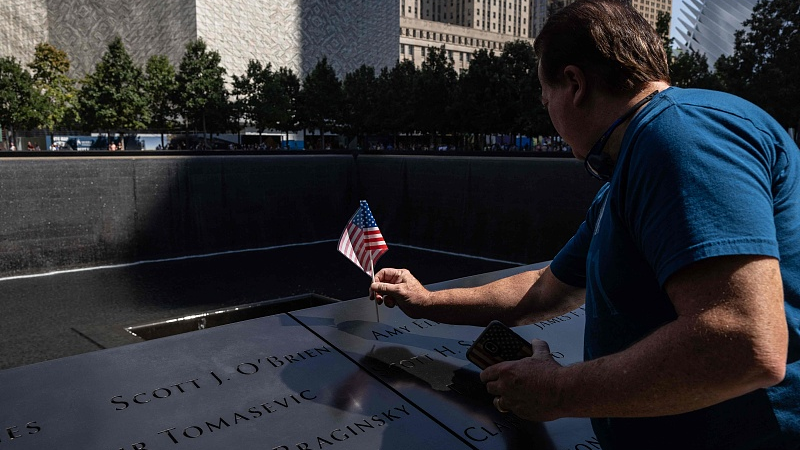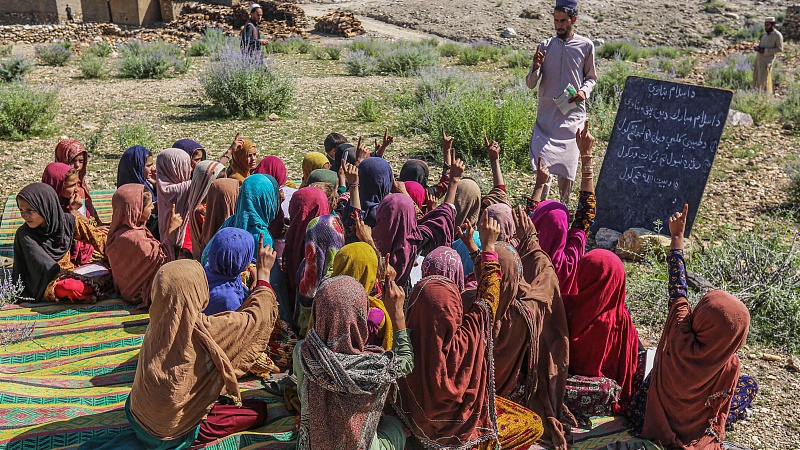
A person places a U.S. flag on the 9/11 Memorial in New York, the U.S., September 10, 2022. /CFP
A person places a U.S. flag on the 9/11 Memorial in New York, the U.S., September 10, 2022. /CFP
Editor's note: Mariam Shah is an Islamabad-based independent researcher in the field of conflict studies and military psychology. The article reflects the author's opinions and not necessarily the views of CGTN.
Today, September 11, marks the 21st anniversary of the terrorist attacks on the United States, which led to a full-scale war against Afghanistan. Washington directed the charge by giving the world an ultimatum: "Either you are with us, or you are with the terrorists." Afghanistan, an already war-torn country, was not directly involved; neither did any Afghan take part in the terrorist attacks on the U.S., but somehow it paid the heavy price because a figurehead of Al-Qaeda was living in Kabul.
After all these years, the prime questions remain the same. Is the world more peaceful now than it was in 2001? Was the U.S. war in Afghanistan a success, and has the war ended in greater peace? Are terrorist and militant groups pacified? The answer to all of these questions is: "NO." Neither is there peace in the world nor has the war or agony ended for the good people of Afghanistan.
Unfortunately, the militant and terrorist groups have morphed into numerous factions across the globe. Even after 21 years and billions of dollars, Washington could not succeed, mainly because of flawed strategies, untimely decisions, and undue diversions.
The entire war chronicle is full of tales of misery for Afghan citizens. Regrettably, there was no justice for the war, justice in the war, or justice after the war. The war destroyed the fundamental fiber of Afghan society and the U.S. withdrawal wreaked havoc on the country and region.
It's been one year since the U.S. withdrew from Afghanistan and the last U.S. troops left the country, ending America's longest war. The present situation in the war-torn region reflects the consequence of the U.S. administration's hasty and irresponsible withdrawal. Whether it was the timing, the process, or basic ethics, the entire withdrawal episode sent shock waves throughout the world, raising fears for regional peace and stability.
The U.S. never thought about the innocent civilians, the refugee crisis, the rise of militant groups, and the leftover weaponry.

Afghan children attend a class at an open air school at Nangarhar, Afghan, September 4, 2022. /CFP
Afghan children attend a class at an open air school at Nangarhar, Afghan, September 4, 2022. /CFP
The internal situation in Afghanistan has been on the decline for nearly the last four decades, but it has gone to an all-time low since last year. The U.S.'s "forever war" did not bring peace or stability to Afghanistan, which it preached. There is utter chaos, instability, and uncertainty in the country and it has affected the lives of ordinary Afghan citizens. Ironically, the issues concerning security have been alarming, since the Islamic State is expanding with the rise of multiple factions across Afghanistan, posing a severe threat to regional peace.
American government spent billions in Afghanistan, but the entire country withered in thin air when they departed. Nothing could sustain or survive, as the whole country was somehow dependent on foreign aid and assistance for years. Leaving a nation, knowing the level of its overall dependency, especially in terms of financial reliance, was a massive mistake for the U.S. administration.
The U.S. compounded a human tragedy when it announced through an executive order to freeze $7 billion from the Afghan central bank's assets in the U.S., aiming to divide the amount as compensation for 9/11 victims' families and the rest as aid for Afghans. As per the recent reports, the U.S. will not release $3.5 billion in frozen Afghan funds, for now citing terror fears. An entire country is suffering because of a misadventure of super power that could not deal with terror elements nor leave the country in a stable position.
Presently, the life of an ordinary Afghan depends on these frozen funds, who are surviving against all odds. According to reports by international organizations and relief agencies, nearly 95 percent of the Afghan population is not getting enough food to eat. Almost half of the population is on the verge of malnutrition, especially women and children.
Somehow, the U.S. is showing an ever-increasing insensitivity and disregard towards the sufferings of Afghan civilians, as political interests have overpowered the humanitarian efforts. After two decades, an apparent war has ended for the U.S., but for Afghans, neither the war has ended nor the suffering.
(If you want to contribute and have specific expertise, please contact us at opinions@cgtn.com. Follow @thouse_opinions on Twitter to discover the latest commentaries on CGTN Opinion Section.)

